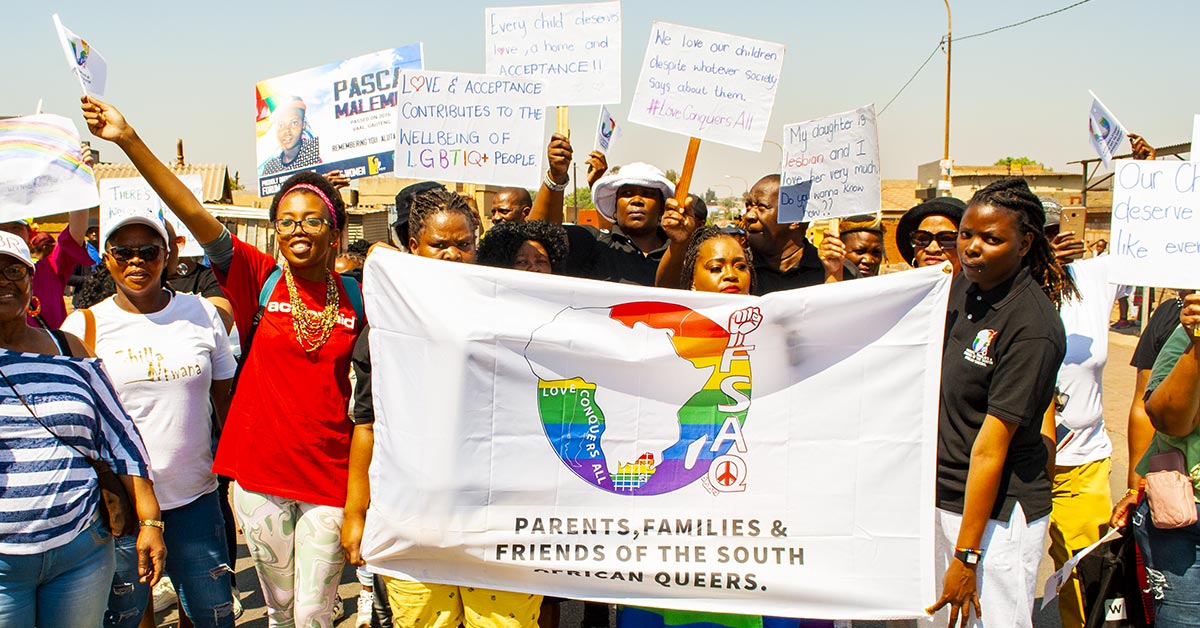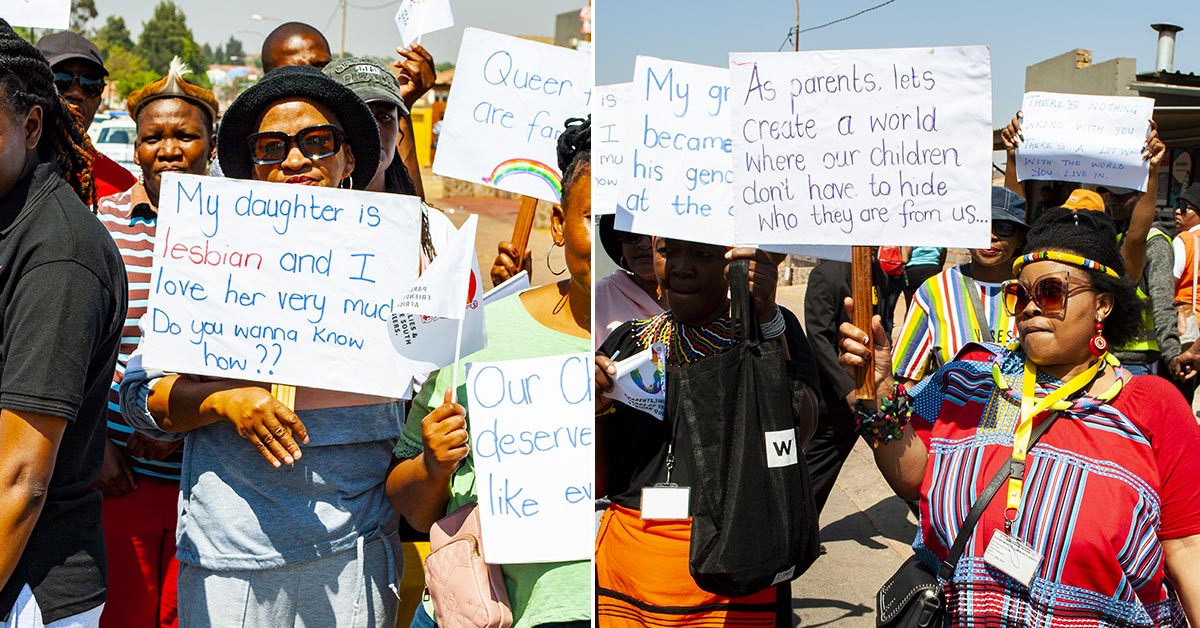Helping parents embrace their queer children

PFSAQ members expressed their love and support for their queer children at Soweto Pride
It’s wonderful to have your family and friends in your corner when you come out the closet; to be supported loved and celebrated. Unfortunately, this is not the experience of many young people in the LGBTQI+ community.
South African society remains deeply conservative and LGBTQI+ youth are at the frontline of anti-queer social stigma, marginalisation and discrimination. They’re especially vulnerable because they are dependent on parents or guardians who may not be accepting of who they are.
In its 2016 Love Not Hate report, OUT LGBT Well-being found that the majority of LGBTQI+ individuals (55%) endured verbal abuse at school, while 35% were threatened with violence.
In just the last few months, Lukhanyo Jongqo, 14, from Stutterheim, Eastern Cape and Tiro Moalusi, 15, from Soweto, Gauteng, died by suicide following alleged homophobic bullying by their teachers. Another learner, Mpho Falithenjwa, 14, from Orange Farm in Johannesburg was subjected to discrimination and bullied for his sexuality. He also died by suicide in June.
The recent significant backlash and “queer panic” around proposed new guidelines to provide a more affirming and welcoming environment in schools also illuminate how far we still have to go as a country to embrace LGBTQI+ youth.
While one would hope that a young person’s home could be a haven from this queerphobia, that’s not the case for many. According to the Other Foundation’s Progressive Prudes (2016) study, one in four South Africans (27%) report having a friend or family member who is homosexual, but 45% stated that they would not “accept” a gay family member.
As a result of family rejection, LGBTQI+ teenagers are at higher risk of homelessness and suicide and there have been numerous reports of family members being the perpetrators of violence and even so-called “corrective” rape.
OUT LGBT Well-being, for example, recently reported the case of a 15-year-old lesbian high school student who was physically and emotionally abused by her family because of her sexuality. It’s worth noting that the Gauteng teen asked for help with sensitising her parents but did not want the matter referred to the police (the case was escalated to a social worker to intervene).
It’s in this context that organisations like Parents, Families and Friends of South African Queers (PFSAQ) are desperately needed. The group supports people who have family members who have come out as queer and aims to educate communities on queerness.
“We had parents who broke down in tears as they told us how they now have a better understanding.”
The group holds regular events to assist parents of queer children to better understand the LGBTQI+ community as well as what their children are experiencing.
“What we find is that some parents are moved to acceptance of their children when they have attended our events, like our queer movie night,” says Relebogile Setshedi of PFSAQ. “We have parents who have realisations at these events that they may not have experienced otherwise.”
PFSAQ held their first National Parents, Families and Allies Seminar in September 2022, hosted at The Other Foundation in Rosebank, Johannesburg.
“The seminar was a success,” reports Setshedi, “We dealt with some big topics such as homosexuality and religion, and the exclusion of queer people by society.”
Each presentation was followed by a discussion between the attendees. It was in these discussion sessions that parents and family were able to tackle thorny subjects, find some common ground and grow their understanding of the queer person in their lives.
“We had parents who broke down in tears as they told us how they now have a better understanding. It was very moving to see the reactions among the parents who came,” says Setshedi.
It’s hard enough coming out of the closet, but it can also be tough and confusing being a family member of a queer person. They have to “come out” too within their community, and in South African society, where many view having a queer child as an embarrassment, it’s important to have the resources not only for LGBTQI+ people but for their support system as well.
“We pledge to keep encouraging other parents and families to accept every queer being because acceptance is the catalyst of love and safety.”
In September, PFSAQ fielded a contingent of parents of queer children at the annual Soweto Pride march. During the procession, the marchers stopped to recognise the organisation’s members.
Several mothers held up signs affirming their love and support for their LGBTIQ+ children. They also collectively read out a pledge to the crowd.
“We pledge to makes the streets of our townships safer for the LGBTIQ+ people. We pledge to use our voices to speak up about the challenges of the LGBTIQ+ people in rooms where we are expected to be silent,” said the women.
“We pledge to keep encouraging other parents and families to accept every queer being because acceptance is the catalyst of love and safety.”
It was a deeply powerful and moving display of solidarity, affirmation, and unconditional love. One that needs to be repeated by parents of queer children in homes and streets across the country.

We all need a place to turn, and PFSAQ is an important resource and support system for parents, friends and family. If you, or anyone you know, are interested in finding out more about PFSAQ, click here.
Leave a Reply